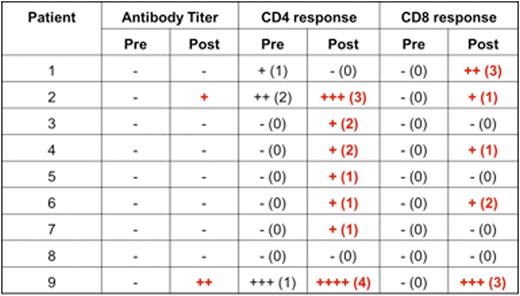Abstract
Background: The identification of suitable target antigens for immunotherapy in myeloid cancer has been a challenge. NY-ESO-1 is a recognized target in solid tumors, but in myeloid cancers expression is silenced by dense promoter hypermethylation. We have demonstrated standard dose decitabine induced expression of NY-ESO-1 in the circulating blasts of AML patients. The level of expression was sufficient to trigger a cytotoxic response in NY-ESO-1 specific CD8+ T cells. We have previously reported our preliminary data demonstrating that vaccination against NY-ESO-1 in combination with decitabine is safe and resulted in NY-ESO-1 specific cellular immune responses in the first six treatment-na•ve myelodysplatic syndrome (MDS) patients on study. We now update our results following complete study accrual.
Methods: We performed a phase I trial of NY-ESO-1 vaccine (anti-DEC-205-NY-ESO-1 fusion protein (CDX-1401) with poly-ICLC adjuvant; Celldex Therapeutics) in combination with decitabine (20 mg/m2/day x 5 days). Patients were enrolled on an IRB-approved protocol. All patients signed informed consent and were treated in accordance with the Declaration of Helsinki. Enrolled patients had intermediate/high-risk MDS by IPSS, were > 18 years old, had ECOG performance status < 2, and adequate hepatic and renal function. Patients with uncontrolled medical illness, HIV-positivity, auto-immunity or recent corticosteroid/radiation therapy were excluded. Patients were vaccinated on day -14, received decitabine on day 1 and were re-vaccinated on day 14 of each cycle. Four cycles of therapy were planned. Peripheral blood was obtained pre-treatment, twice weekly, and at end of treatment (EOT). CD11b+ myeloid cells were isolated from each sample. Immune monitoring was performed at baseline and end of treatment.
Results: Nine patients (median age 64y, range 57-71) have been enrolled and treated on study; all have completed therapy. As previously reported, adverse events were decitabine and disease related. We quantified LINE-1 (surrogate for global methylation) and NY-ESO-1 promoter methylation in the CD11b+ myeloid population throughout treatment. The methylation nadir for LINE-1 and NY-ESO-1 occurred between days 8 and 18 of each decitabine cycle. Changes in LINE-1 and NY-ESO-1 methylation were correlated for eight patients (R2 = 0.91-0.99, p < 0.0001). We observed that 7/9 patients demonstrated induced expression NY-ESO-1 mRNA (by nested RT-PCR) in CD11b+ cells. There was no baseline humoral immunity to NY-ESO-1. Seroconversion was observed in two subjects, both of whom demonstrated induced NY-ESO-1 expression. 7/9 and 5/9 patients demonstrated NY-ESO-1 specific CD4+ and CD8+ T-cell responses respectively following vaccination. There were no significant changes in the frequency of CD25+ FOXP3 positive T-regulatory cells from baseline to the end of therapy. NY-ESO-1 specific T-cell recognition of myeloid cells with induced antigen expression will be analyzed.
Conclusion: Circulating myeloid cells exhibit decreased global and NY-ESO-1 promoter methylation. A majority of treated patients show induction of NY-ESO-1 mRNA in the myeloid compartment with vaccination induced CD4+ and CD8+ T-cell responses in a majority of patients. Patients without evidence of induced expression in circulating myeloid cells had poor cellular immune response to vaccination. These data indicate that MDS patients receiving standard decitabine may benefit from immunological targeting of reactivated NY-ESO-1.
Response to Vaccination. T cell response assessed by ELISPOT for IFN-g and scored after subtracting background. Numbers in parentheses indicate number of epitopes recognized by T cells. Bold type indicates responses induced or enhanced by vaccination.
Response to Vaccination. T cell response assessed by ELISPOT for IFN-g and scored after subtracting background. Numbers in parentheses indicate number of epitopes recognized by T cells. Bold type indicates responses induced or enhanced by vaccination.
Karpf:Astex Pharmaceuticals: Research Funding. Wang:Incyte: Speakers Bureau; Immunogen: Research Funding. Griffiths:Astex Pharmaceuticals: Consultancy, Research Funding; Celgene Inc: Consultancy, Honoraria; Alexion Pharmaceuticals: Consultancy, Honoraria.
Author notes
Asterisk with author names denotes non-ASH members.


This feature is available to Subscribers Only
Sign In or Create an Account Close Modal